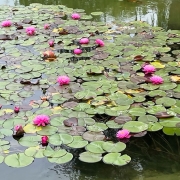Nothing Thrives In Ambiguity
We are living in a time when there is a great intolerance for ambiguity. Most likely because the world is changing rapidly with an ever increasing sense of uncertainty. And in times of transition and upheaval, humans often lean toward the concrete as a means of staving off anxiety and pain. We see this in fundamentalist doctrine where rigid adherence to absolutes can be a way to ward off complexity and growth because it feels safer to cling to what is known.
If we can learn to tolerate a degree of ambiguity, we become more receptive to different perspectives. And great learning and growth can result in these periods of change that lack definition. There is a certain freedom in this that allows new possibilities to emerge.
The challenge though is that too much ambiguity for too long creates a chronic state of unpredictability. And this is destabilizing. Nothing thrives in this kind of environment. We don’t want to hang out in ambiguity forever. No matter how sophisticated and complex we might be, we still need boundaries, routines, and rules. Consequences and clarity. Without them children don’t feel safe and can’t thrive in their home and school environments. In relationships, we never know where we stand. And in society, anarchy can reign and/or cultures fall apart.
There comes a point when too much ambiguity becomes damaging to all parties.
We don’t want to be so rigid in our approach to life, work, and relationships that we rule out new possibilities. But we don’t want to be so fluid, we find ourselves like a blot of ink spilling out all over the page. At some point, clarity becomes essential, safe and grounding. We owe this to ourselves and to each other.

